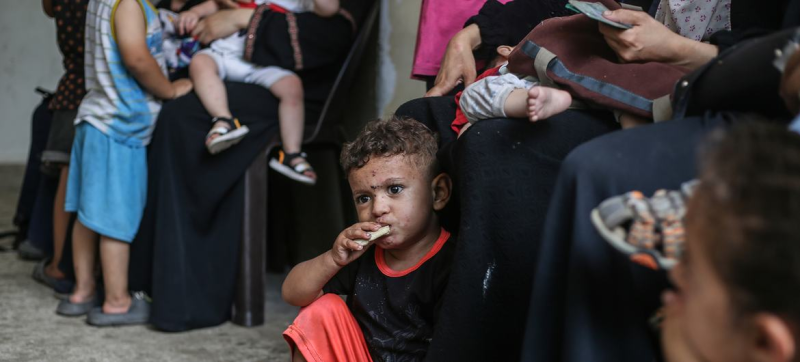- Reflecting on Climate Week NYC 2025: Collaborating to Scale Impact |
- Former AL MP BM Mozammel Haque arrested in Dhaka |
- Prof Yunus expresses solidarity with Shahidul Alam and Gaza |
- Tk 38-cr Rangpur women’s sports complex now grazing ground! |
- 70 Dead in Gaza as Trump Urges Israel to Halt Strikes |
UN Urges Bold Action as Gaza War and West Bank Crisis Worsen

Children eat high-energy biscuits at a nutrition screening clinic in Gaza.
Nearly two years of war in Gaza, continued violence, and settlement expansion in the occupied West Bank – along with talk of an imminent Israeli takeover of the entire Strip – formed the backdrop to a Security Council meeting on Wednesday, as UN officials underscored the urgent need to end the conflict between Israelis and Palestinians.
“Today the world looks on in horror as the situation in the Occupied Palestinian Territory continues to deteriorate to levels not seen in recent history,” said Ramiz Alakbarov, UN Deputy Special Coordinator for the Middle East Peace Process, speaking from Jerusalem.
He began by focusing on Gaza, which is “sinking deeper into disaster, marked by rapidly mounting civilian casualties, mass displacement, and, now, famine,” with no end in sight to the conflict.
“For a population already struggling to survive, Palestinians in Gaza are seeing their worst fears become reality in front of their eyes,” he said, referring to Israel's ongoing announcement of its decision to take over Gaza City.
“Expanded military operations in Gaza City will have catastrophic consequences, including displacing hundreds of thousands.”
Mr Alakbarov briefed the Council alongside Joyce Msuya, UN Assistant Secretary-General for Humanitarian Affairs, and two guests: Inger Ashing, Chief Executive Officer at Save the Children International, and Ilana Gritzewsky, an Israeli hostage who survived Hamas captivity in Gaza.
He reported that Israeli military strikes have intensified throughout the Strip, hitting tents housing displaced people, schools, hospitals, and residential buildings. Since 23 July, at least 2,553 Palestinians have been killed, according to health authorities. Of this number, 271 were reportedly killed while attempting to collect aid near militarised distribution sites.
Additionally, more than 240 journalists have been killed since the war began on 7 October 2023 following deadly Hamas-led attacks on Israel.
Although the UN and partners are working tirelessly to assist people in Gaza, “the security risks are extremely high, and current mitigation measures are woefully insufficient,” he said.
“On my recent visit to Gaza, I was stunned at the scale of the destruction and suffering. I met humanitarian workers risking their lives to deliver aid, while themselves living in intolerable conditions,” he added.
The UN official also visited affected communities in Israel and met survivors of the terror attacks, as well as family members of hostages.
“I saw the shattered homes of Nir Oz, where one in four residents was either murdered or abducted on 7 October. I met survivors who carry unbearable loss and trauma,” he said.
Around 50 people, including one woman, are still being held by Hamas and other Palestinian armed groups in Gaza, and 28 are believed to be dead. Videos released by Hamas and Palestinian Jihad depicting emaciated Israeli hostages were described as deeply disturbing, with Mr Alakbarov stressing that ill-treatment of hostages is a blatant violation of international law.
Meanwhile, the situation in the occupied West Bank, including East Jerusalem, “continues to spiral dangerously downward.” He warned that “the territory envisioned for a future Palestinian State is shrinking, while a one-State reality of unlawful occupation and perpetual violence is rapidly advancing.”
Israeli security forces have continued operations in northern cities and refugee camps, displacing more than 32,000 people. Nine Palestinians – including four children – were killed during the three-month reporting period.
Since the start of the war in Gaza, settler attacks have escalated in frequency and become more violent and deadly. The violence has led to forced displacement, with settlers moving in and establishing outposts. At the same time, Israel is “fast-tracking settlement expansion, including in the most highly strategic areas.”
The Israeli High Planning Committee recently approved plans for more than 3,400 housing units in the E1 area, a move that “would effectively sever the connection between the northern and southern West Bank” and further undermine the possibility of a viable Palestinian state.
These developments occur amid a volatile regional context, with more exchanges of fire between Houthi rebels in Yemen and Israeli forces this week, alongside continued Israeli strikes in Lebanon and an incursion in Syria.
Ms Msuya centred her briefing on famine in Gaza, describing it as “a created catastrophe – the result of conflict that has caused massive civilian death, destruction, and forced displacement.” She warned that more than half a million people already face starvation and that the numbers could exceed 640,000 by the end of September.
She urged the Council to ensure an immediate and sustained cessation of hostilities, the release of all hostages, protection of civilians, and safe humanitarian access.
Ms Gritzewsky, a former hostage, shared her personal story of captivity and appealed passionately for the release of all those still being held.

